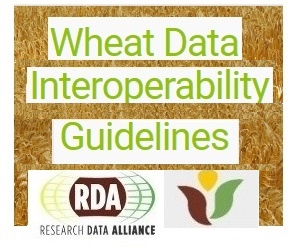Developing Data Interoperability using standards: A Wheat Community use case
01/11/2017


The International Wheat Initiative (IWI) has identified easy access and interoperability of all wheat-related data as a top priority for the wheat research community (and agriculture in general), which is in line with FAIR (findable, accessible, interoperable, re-usable) data principles.
|
Interoperability - - understood as a the ability of two or more systems to cooperate to exchange and interpret shared data/information - - is a growing concern for different research communities - - as the need to interpret the deluge of (managed, published, and reused) data obtained through high-throughput technologies grows ... |
To face the challenge of data interoperability in wheat research community, members of the Wheat Data Interoperability Working Group (WG)
|
- - one of the WGs of the Research Data Alliance (RDA) and the only WG of the Agriculture Data Interoperability Interest Group (IGAD) - - |
published the Wheat Data Interoperability Guidelines, which provide information on the best practices (in terms of use of data formats, metadata standards and ontologies), tools, recommendations and examples on how to create, manage and share data related to Wheat.
|
This joint effort of the Wheat Research Community is presented in the recently published article : Dzale Yeumo E, Alaux M, Arnaud E et al. Developing data interoperability using standards: A wheat community use case [version 1]. F1000Research 2017, 6:1843 (doi: 10.12688/f1000research.12234.1), Enjoy the reading ! |
A community-driven approach for data interoperability guidelines design, validation, publishing and adoption - - described in detail in the aforementioned article - - is generalizable to other (agricultural) domains.
In particular, built on existing standards and practices, the Wheat Data Interoperability Guidelines present a selected set of recommendations on how to publish and manage data types identified by the wheat research community as the most important for the coming years, such as:
|
sequence variants : |
genome annotations : |
phenotypes : |
|
germplasm data : |
gene expression analysis measures the abundance of the mRNA molecules, and gives us insight into the regulation of the genes of interest. |
physical maps |
The Wheat Data Interoperability Guidelines of the WDI-WG are intended for data producers, data managers, data consumers, and software developers.
The adoption of this guidelines - - that constitute a key building block for FAIR data sharing infrastructures - - will facilitate the depositing of data within well recognized repositories in addition to make them easily understandable and reusable.
___________________________________________________________________________________________________
Related:
- International Wheat Information System (WheatIS) - a single-access web base system to access to the available data resources and bioinformatics tools to support the wheat research community
- AgroPortal : a common unique repository of standard vocabularies and ontologies relevant for wheat. As of today, AgroPortal's Wheat group contains 20 ontologies of the 23 identified by the WDI-WG.
- IGAD Data Experts shared their Knowledge & Expertise at the RDA-IGAD Pre-Meeting in Montreal
- Dzalé Yeumo E, Fulss R, Alaux M, et al.: Wheat Data Interoperability Guidelines, Ontologies and User Cases. Recommendations from the RDA Wheat Data Interoperability Working Group. EUDAT B2Share.2017
- Subirats I, Cooper L, Shrestha R, et al.: Towards a Comprehensive Overview of Ontologies and Vocabularies for Research on Wheat. Zenodo. 2015
